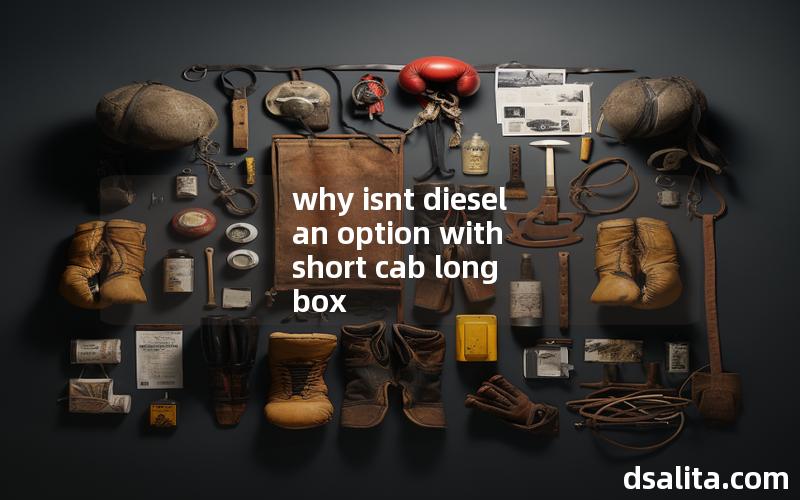Why isn’t diesel an option with short cab long box?

When it comes to choosing a truck, one of the options that many people consider is whether to go with a diesel engine or a gasoline engine. However, when it comes to the configuration of a short cab long box truck, diesel engines are not often offered as an option. There are several reasons for this, which we will explore in detail below.
1. Size and Weight
Diesel engines are typically larger and heavier than gasoline engines. This can pose a problem in a short cab long box truck, where space and weight are already at a premium. The larger size and weight of a diesel engine can make it difficult to fit within the constraints of the truck’s design, and can also affect the overall balance and handling of the vehicle.
Additionally, the weight of a diesel engine can impact the payload capacity of the truck. In a short cab long box configuration, where the bed is already extended, the added weight of a diesel engine could further limit the amount of cargo that can be carried.
2. Cost
Diesel engines are generally more expensive than gasoline engines. This additional cost is due to the more complex design and construction of diesel engines, as well as the higher cost of diesel fuel. In a short cab long box truck, where cost is often a consideration, manufacturers may choose to offer only gasoline engine options in order to keep the price of the vehicle more affordable.
Furthermore, the cost of maintaining and servicing a diesel engine is typically higher than that of a gasoline engine. This is another factor that manufacturers may take into account when deciding whether to offer diesel engines as an option in a short cab long box truck.
3. Fuel Efficiency
While diesel engines are generally known for their fuel efficiency, this advantage may not be as significant in a short cab long box truck. The extended length of the truck can increase wind resistance and drag, which can negatively impact fuel efficiency. In this case, the potential fuel savings of a diesel engine may not outweigh the added cost and complexity.
4. Market Demand
Manufacturers often base their decisions on market demand. If there is not enough demand for diesel engines in a short cab long box truck configuration, manufacturers may choose not to offer them as an option. This could be due to factors such as the specific needs and preferences of the target market, or the availability of other engine options that better suit the intended use of the truck.
5. Emission Regulations
Stringent emission regulations have become increasingly important in recent years. Diesel engines are known to produce higher levels of pollutants compared to gasoline engines. Meeting these emission standards can be more challenging for diesel engines, especially in a short cab long box truck where space for emission control systems may be limited.
As a result, manufacturers may opt to focus on developing and offering gasoline engines that can meet the required emission standards more easily, rather than investing in the development and certification of diesel engines for this specific truck configuration.
Conclusion
While diesel engines offer certain advantages such as torque and durability, they may not be a viable option in a short cab long box truck due to factors such as size and weight constraints, cost considerations, potential impact on fuel efficiency, market demand, and emission regulations. Ultimately, manufacturers make decisions based on a combination of these factors to provide the best options for their customers in this particular truck configuration.

 Dsalita Boxing
Dsalita Boxing






